Sarasota, Fla. – New College of Florida recently unveiled its new mascot, the “Mighty Banyan.” The mascot, is a fierce-looking, flexing banyan tree, based on a design by first-year student Anna Lazzara.
As the college progresses toward being the best liberal arts college in the country, a student- designed mascot, inspired by the many banyan trees on campus, will be the new face of the college.
The banyan tree is known for its aerial roots, which sprout from branches and eventually reach the soil, and its ability to live for centuries. They are also considered the world’s biggest trees in terms of the area they cover. In a way, the entanglements of the roots and branches all under the vast canopy echoes the interweaving of the past, present, and the future.
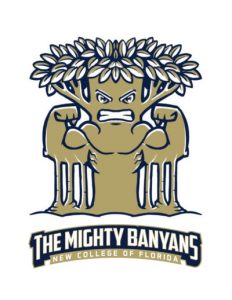 “The updated mascot symbolizes the future vision of New College and what we are all working so hard toward,” said Interim President Richard Corcoran. “From strength, growth and longevity, to many branches working as one, the Mighty Banyan is the perfect representation of who we are here at New College, as well who we are aiming to become.”
“The updated mascot symbolizes the future vision of New College and what we are all working so hard toward,” said Interim President Richard Corcoran. “From strength, growth and longevity, to many branches working as one, the Mighty Banyan is the perfect representation of who we are here at New College, as well who we are aiming to become.”
“When I heard the news that the college was seeking a new mascot, I began to think about what the New College spirit means to me,” said Lazzara. “After much thought, I realized that the New College spirit is the combination of a supportive community and a stunning natural landscape. Both of these things, I believe, are perfectly represented in the form of a mighty Banyan tree.”
“As with every decision made thus far, we think about the students first, and we are proud that this mascot was born from one of our student’s designs,” continued Interim President Corcoran. “We are excited about this development for New College, but we are also looking forward to the many new projects happening around campus that will undoubtedly enhance and improve the experience for current and future students of New College of Florida.”
Founded in Sarasota in 1960, New College of Florida was named the No. 5 Public National Liberal Arts College from U.S. News & World Report in 2023 and is the Honors College of Florida. New College provides students with a highly individualized education that combines academic excellence with career preparation experiences. New College offers more than 50 undergraduate majors in arts, humanities and sciences; a master’s degree program in applied data science; and certificates in technology, finance, and business skills.
Sarasota, Fla. — New College of Florida Interim President Richard Corcoran is honored to announced that Dr. Scott Atlas will be the commencement speaker for New College’s graduation ceremony on Friday, May 19, 2023, on the Bayfront of the Historic Ringling Mansion.
Scott W. Atlas, MD is the Robert Wesson Senior Fellow in health policy at the Hoover Institution of Stanford University and Co‐Founder & Co‐Director of the Global Liberty Institute, among other notable affiliations. The Global Liberty Institute is an independent and non-partisan institute for promoting individual and economic freedom and the free exchange of ideas throughout the world.
Dr. Atlas investigates the impact of government and the private sector on access, quality, and pricing in health care, global trends in health care innovation, and key economic and civil liberty issues related to health policy. He is a frequent policy advisor to policymakers and government officials in the United States and in other countries. He has served as Senior Advisor for Health Care to numerous candidates for President and members of the U.S. Congress, and advised key federal health agencies. From August through November, 2020, he served as Special Advisor to the President and a member of the White House Coronavirus Task Force. Before his policy appointment at Hoover Institution, he was Professor and Chief of Neuroradiology at Stanford University Medical Center for 14 years and in academic medicine for 25 years. He has published more than 100 peer-reviewed scientific publications, 200 policy pieces, and numerous books. He has received many awards in recognition of his leadership in policy and medicine, including the 2022 Encounter Prize for Advancing American Ideals; the 2021 Freedom Leadership Award, Hillsdale College’s highest honor; and the 2011 Alumni Achievement Award, the highest career achievement honor for a distinguished alumnus from the University of Illinois in Urbana‐Champaign. Dr. Atlas received his MD degree from the University of Chicago School of Medicine.
“Dr. Atlas’ perspective and resume are impressive; he is a champion and fighter for free speech and a renowned national leader,” said Interim President Corcoran. “We are happy to welcome him here at New College, where we place a high value on personal freedom and individual autonomy, as Dr. Atlas does.” “Dr. Atlas is a noted commencement speaker and comes at such a pivotal time for New College,” continued Interim President Corcoran. “But that is not only what led me to asking him to speak to our graduates. Dr. Atlas is a first-generation college student in his family, he knows the value of hard work and what a path to higher education can lead to in one’s future. He has spoken about being bold and rising up over challenges, even amongst criticism. That spoke to me as we seek to stand up for the future of New College, our students and faculty – and now our graduates. I am proud and honored that he has accepted our invitation to speak.”
Over the course of four days, Art Center Sarasota’s west side was transformed into a beautiful mural that will stay for two years. This project allowed students from the Boys and Girls Club to take part in designing Sarasota. Through this, they developed a stronger connection to their community and learned valuable skills.
Art Center of Sarasota explained that the goals of this project included teaching the students problem solving, communication, teamwork, and spatial reasoning. Both organizations connect to the youth in their areas and inspire them to pursue their passions and prepare them for a successful future.
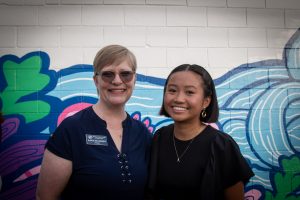
Their search for the perfect muralist led them to Annie Dong, who was dedicated to creating a beautiful addition for Sarasota — an opportunity she had dreamed of — while encouraging the young artists in our community. Annie is currently an art and psychology student at New College of Florida. She is working towards a career in art therapy and has prior experience with murals.
Her goals for the mural project were to help the students bond as a respectful and communicative team that could have fun together. She looked back fondly at the discovery that basketball — not art — was the group’s main passion because of how talented they were, and she had the opportunity to express that art was born from unrestricted creativity that can take several forms.
“I learned that in their free time, they have fun writing music and poetry,” Annie remarked. “I acknowledge to them that art is more than just painting or drawing. Art exceeds that because you are allowing your creativity to flow. That is what makes it art — the power to be able to create. That put smiles on their faces, and that was for sure one of many of my favorite moments.”
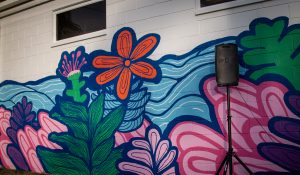
When asked about what inspired the theme of the mural, Annie described how the location of Art Center Sarasota was the main consideration. The development of the Bay has showcased Sarasota’s nature scene and has become a popular place to spend time. Because the mural is seen from the Mangrove Path, it was designed to fit into the Bay’s natural theme. It depicts waves and florals that fit the location perfectly. The color palette was based on Annie’s previous murals and the Boy and Girls Club logo.
The ribbon cutting was held on January 19th, where Art Center Sarasota and the Boys and Girls Club introduced the mural to the city’s residents. Annie and the students were celebrated for their hard work with ice cream, photoshoots, and a small party afterwards. This was the perfect addition to our Sarasota community.
Devon Geary is a student contributor to the New College News.
Photos by Remy Katz.
In 2019, the Mellon Foundation awarded a five-year $750,000 grant to New College of Florida. New College + the Cross College Alliance in the Community supports curricular and research initiatives that preserve local history, integrate social and racial justice work into artistic practice and teaching, and explore questions of special interest to the local community. As a result of this grant, six new courses have been developed at New College, five of them being offered this spring.
“For a public liberal arts college like New College, grants from private donors such as the Mellon Foundation allow us to extend our resources, create new opportunities for students and faculty, and increase our community impact. We are incredibly excited that the Mellon grant’s promotion of college-community partnerships is resulting in innovative learning experiences for students, faculty, and community members alike,” said NCF Assistant Vice President for Academic Affairs, Dr. Maneesha Lal.
Last spring, a call for course proposals was sent to NCF faculty and to Cross College Alliance institutions (New College of Florida, Ringling College of Art and Design, The Ringling/Florida State University, University of South Florida Sarasota-Manatee, and State College of Florida, Manatee-Sarasota). Of nine proposals received, six community-based projects were awarded funding. Faculty and community partners met over the last several months to design and plan the course content, logistics, and learning outcomes. Five of the six courses will be taught in the spring 2023 semester, and one will be taught next fall. The six courses are:
Devised Theatre and Collaboration for Social Engagement
Developed by NCF Professor Diego Villada and FSU/Asolo Conservatory for Actor Training Professor Eliza Ladd, this course will instruct undergraduate students in the techniques of Devised Theatre, a process of creating new work without a pre-existing script. Students and faculty will collaborate with artists from the CreArte Latino Cultural Center to generate an original theatre piece that incorporates stories from the Florida Gulf Coast’s Latinx community. The performance will be presented in three local venues.
Museum Studies in Theory and Practice: Interdisciplinary Exhibition Development
Students in this iteration of NCF Professor Katherine Brion’s introduction to museum studies course will have the opportunity to apply what they learn about museum theory to a hands-on interdisciplinary project relevant to museum careers. With additional support from Dr. David Berry, Chief Museum Curator for Marie Selby Botanical Gardens, students in Professor Brion’s class will collaborate with Professor Heidi Harley’s class (see below) in the development of an exhibition centered on dolphin research. The goal is to establish a model for presenting scholarly and creative activity occurring at New College in a manner that engages local communities.
New Stories, New College: An Interdisciplinary Laboratory Showcasing Community Science/Conservation through Curatorial Interpretation and Interactive Design
Students in NCF Professor Heidi Harley’s course will work with instructors from the Chicago Zoological Society’s Sarasota Dolphin Research Program to study dolphins from multiple perspectives, and, in collaboration with Professor Katherine Brion’s class (see above), will translate dolphin science into an interactive exhibit for lay audiences. Using tested methods of museum exhibit design, students will create a process that can serve as a prototype for future exhibits that seek to draw the public onto the NCF campus.
Growing Up Amish in Sarasota
This course will be a collaboration between NCF Professor of Religion Manuel Lopez and a member of the local Mennonite community, JB Miller. Students will consult with representatives from the Amish community to explore the history, religious practices, and economic role of the Amish in Sarasota since their arrival in 1925. Offered alongside the course will be a public talk by widely recognized scholar of Anabaptism Steven Nolt as well as a photographic exhibition by local Amish photographer Katie Troyer.
Exploring Local Microbes Through Community Media Projects
Taught by NCF Professor Erika Diaz Almeyda along with 12 community-partner guest speakers, this laboratory course will introduce students to microbes through a community-based, place-based lens. The final projects will use local data on the diversity of microbes and document local microbial histories via photography, artwork, and texts to create a multi-media exhibition.
Heritage: Theory and Practice for the Sarasota African American Historical and Cultural Center
This course, to be co-taught by NCF Professor Uzi Baram and Vickie Oldham, President and CEO of the Sarasota African American Cultural Coalition (SAACC), will contribute to creating a historical and cultural center for Sarasota. Students will draw upon African American heritage studies, oral history, anthropology, and museum studies as they participate in the early visioning of this new cultural institution and help develop exhibits and curate content for displays. This course is scheduled for the fall 2023 semester.
This was the second such grant awarded to New College by the Mellon Foundation. The first grant came in 2016 and was also a five-year $750,000 grant. New College: Connecting the Arts + Humanities on Florida’s Creative Coast promoted partnerships among New College, local arts organizations, and Cross College Alliance institutions in order to foster a deeper understanding of the arts and humanities through a rich array of cultural programs and events.
Developed through faculty collaborations with diverse community partners, the courses that are being funded by the second Mellon grant will help students learn about community priorities and provide them with hands-on learning experiences. Whether exploring microscopic organisms, Latinx stories, Amish-run enterprises, bottlenose dolphins, or African-American histories, students will better understand the place in which they live, make meaningful connections with local leaders, and share their research and insights for mutual benefit.
“The larger hope is that through such community-engaged learning, students will enlarge their sense of civic responsibility and purpose,” Lal said. “New College of Florida is committed to its public mission and these partnerships help us continue to serve as a vital resource in our community.”
Learn more about Mellon Community Engagement at New College.
Gayle Guynup is a contributor to New College News.
The members include: Arlene Acevedo, Alexis Carter, Tiahna Sterling and Aline Vasquez Martinez. The musicians have been together as a group since high school and their musical talent strengthened alongside their friendship. The name Recap comes from the idea of “recapping the memories and accomplishments we have achieved together.” Along with representing friendship, they hope to inspire people to pursue their goals and dreams.
New College’s educational experience encourages students to follow their passions and even combine them at times. Recap is a perfect example of how to combine several passions, and the success that can follow.
Acevedo is a 21-year-old student at Middlesex County College, working toward a career as a dental hygienist. Carter is a 21-year-old student at Rutgers University, pursuing a career as a physician’s assistant in plastic surgery. Sterling is a 20-year-old student at Montclair State University, studying music therapy and psychology. Martinez is 21 and working toward a business law career.
The group’s debut album, Count to Five, was released in 2021 and has been on NPR’s Top 10 “Classical Albums of the Year” and “Top 100 Songs of the Year” lists. The group represents the ability to choose to follow your dreams, and the idea that one should not be limited to a future following a singular interest. There is room in life to take both paths.

Speaking of dreams, that’s exactly what the performance felt like. The stage and performers were highlighted in pink and blue. The choreographed movements and the music that followed created a hauntingly beautiful scene that repeated throughout the show. The group captured the audience’s attention immediately and held it for the rest of the performance.
The songs performed included Hold by Lainie Fefferman, Moving Through Fog by Hannah Boissonneault, Hammers by Allison Loggins-Hull, by the time we look for it by Jenny Beck, Count to Five by Angélica Negrón, moi toute seule by Mahak Sadeghzadeh, and Drip by Sage Shurman. This includes several “found percussion” pieces, where the instruments used are nontraditional. For example, Recap used wine glasses, fans, newspaper, playing cards, chairs and bubble wrap. The result was intriguing and beautiful music that piqued the listeners’ curiosity. The creativity used for the group’s music was inspirational.
When asked about advice they would give students studying music with similar goals, the musicians said to never give up and don’t listen to people discouraging you. They are truly a group that will go far in the music industry and encourage others to follow their example.
New Music New College has several performances coming up:
| In C Artist Conversation, PepsiCo Arcade
Thurs. Nov 17 5 p.m.
|
Inside In C, PepsiCo Arcade
Sat. Nov 19 8 p.m. |
| Kathleen Supove Artist Conversation, Mildred Sainer Pavilion
Thurs. Jan 12 5 p.m.
|
Kathleen Supove, Mildred Sainer Pavilion
Sat. Jan 14 8 p.m. |
| Frankenstein Artist Conversation, ACE Lounge
Thurs. March 2 5 p.m. |
It’s Alive! A Monstrous Circus on Frankenstein, Koski Plaza
Thurs. March 4 8 p.m. |
|
Pamela Z Artist Conversation, Club Sudakoff Thurs. April 27 5 p.m. |
Pamela Z, Club Sudakoff Sat. April 29 8 p.m. |
Learn more about Recap Quartet on Instagram and Spotify.
Learn more and purchase tickets for New Music New College (free to attend with NCF ID, artist conversations are free to all): ncf.edu/nmnc
The series began with a kickoff brunch on Tuesday morning under the bayfront tent, during which New College President Okker, Ph.D. introduced the crowd to the unifying, year-long initiative that is The New College Challenge.
The Challenge, she explained, was designed to bring together students, experts and leaders from top universities and industries who will work to address the challenges facing our region and world today. The initiative was modeled after two endeavors in the Northeast: “Envision Resilience: Nantucket Challenge” and “Envision Resilience: Narragansett Bay.”
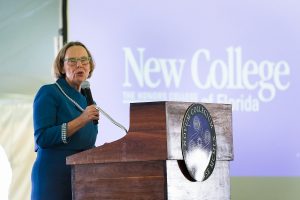
“New College can play a key role in retaining top talent for our state. The New College Challenge is our vehicle to get us there,” Okker said. “The design teams we’ve invited will help us find new and fresh ways to improve our infrastructure, to ensure that our campus supports our students. The relationships with employers, community members and other academic institutions we are developing through The Challenge will ensure the very resilience of New College.”
And the launch of The New College Challenge—with its series of discussions about protecting coastal campuses and communities—could not have arrived at a more critical time. Less than a month ago, Southwest Florida experienced the devastating effects of Hurricane Ian, prompting locals to reimagine how to better safeguard against future environmental impacts.
Throughout The Challenge, New College will become a community incubator for brainstorming new ideas and solutions about the future. New College has already enlisted experts from Harvard, Yale, the University of Florida, the University of South Florida, Kean University, Syracuse University and the University of Miami to lend their unique perspectives.
Tuesday Kickoff
The Tuesday kickoff event welcomed three expert panelists to discuss the topic of resilience, moderated by DreamLarge Founder Anand Pallegar.
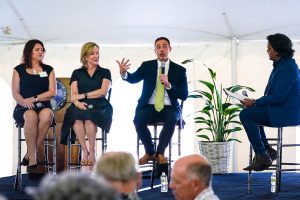
The panelists were: Taryn Sabia, an associate professor of research at the University of South Florida and the co-founder of the urban design collaborative, Urban Charrette, Inc.; Teri Hansen, the president and CEO of Charles & Margery Barancik Foundation; and Kevin O’Farrell, Ph.D., the chancellor for the Florida Department of Education’s Division of Career and Adult Education.
“[The New College Challenge] is an opportunity for knowledge exchange,” Sabia said, to which Hanson added, “New College has the opportunity to be the academic and intellectual epicenter of our community.”
Special guest William Dudley, a New College alumnus and the former president/CEO of the Federal Reserve Bank of New York, also discussed the topic of “resilience” from an economic/financial perspective.
Wednesday Lecture
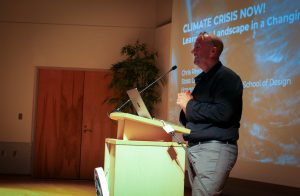
On Wednesday evening in Mildred Sainer Pavilion, resilience was addressed in a “New Topics” lecture entitled “Climate Crisis Now! Learning and Landscapes in a Changing Environment.” Speaker Chris Reed, a professor at Harvard University and the founding director of STOSS Landscape Urbanism, shared his ambitious vision to be climate-ready in order to protect coastlines.
“Campus must be designed both for the ever-changing nature of landscapes and the environment, and for its own inherent social development,” Reed began, “weaving…programming needs, institutional alignments, environmental sustainability and maintenance considerations with equity and social justice imperatives.”
Friday Symposium
And all day on Friday in the bayfront tent, crowds converged for the “Designing for Resilience” Symposium on coastal resilience and adaptive strategies. Big questions were posed, such as “How can we design more resilient communities in the face of coastal threats like storm surge?” National experts presented case studies and research relevant to the Gulf Coast, and input from the community offered direction for their ongoing work.
David Brain, Ph.D.—a professor of sociology and the director of the Urban Studies Program at New College—moderated two panel discussions.
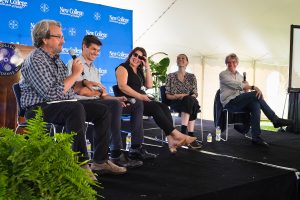
“It’s not just about getting the solutions right; it’s about figuring out what the real questions are,” Brain said of The Challenge. “That’s what we’re learning through this process.”
To this end, Amber Whittle, Ph.D., the executive director of Southface Sarasota, spoke about Southwest Gulf Coast resilience.
Heritage Conservation Specialist Marty Hylton moderated a panel about the “Envision Resilience Challenge: Nantucket and Narragansett” with ReMain Nantucket Executive Director Cecil Barron Jensen and Project Manager Claire Martin; as well as Carolyn Cox, executive director of the Florida Climate Institute; and Bob Miklos, founder of designLAB architects.
Several higher education leaders gave a series of “Designing for Resilience” presentations, including Sabia; Alan Plattus, professor and founding director of the Urban Design Workshop at Yale University; David Mohney, dean of the Michael Graves College, Architecture and Design, at Kean University; Jeff Carney, associate professor in the School of Architecture at the University of Florida; Ted Brown, professor in the School of Architecture at Syracuse University; and Sonia Chao, research assistant professor and director of the Center for Urban & Community Design at the University of Miami.
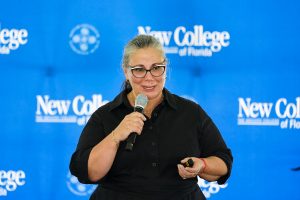
Chao discussed her experience with Hurricane Andrew in 1992 and how it impacted her perspective on rebuilding along the coast after natural disasters.
“That moment really changed the rest of my trajectory,” Chao said about shifting her career toward addressing resilience. “How can we build more resiliently? That takes an envisioning process, and that process entails community conversations.”
There will be many more of these conversations over the course of the year.
For more information on The New College Challenge, visit ncf.edu/challenge.
The event, hosted along the New College bayfront, was the launch of an initiative focused on coastal, economic and social resilience.
“I’m excited that you’ve joined us at this important moment for our college and our community as we begin a unifying year-long initiative to dream big and innovatively,” said New College President Patricia Okker, Ph.D., welcoming the crowd to a two-hour brunch event with lauded panelists and speakers.
The Challenge, Okker explained to the group, was designed to bring together students, experts and leaders from top universities and industries who will work to address the pressing challenges facing our region and our world today. The initiative was modeled after two endeavors in the Northeast: “Envision Resilience: Nantucket Challenge” and “Envision Resilience: Narragansett Bay.”
And the launch of The New College Challenge—with its series of community conversations about protecting coastal campuses and communities—could not have arrived at a more appropriate time. Less than a month ago, Southwest Florida experienced the devastating effects of Hurricane Ian, prompting locals to reimagine how to better safeguard against future environmental impacts.

“If ever there was a time to embrace new solutions, it is now. Whether through the unprecedented disruptions in the world of work, pressures on higher education, or the urgency of coastal resilience, this is no time for the status quo,” Okker said. “Our launch of The New College Challenge today is, at its heart, a commitment to resilience of all kinds and to the transformations necessary to achieve that resilience.”
Throughout the year-long Challenge, New College will become a community incubator for the big, bold ideas that Okker is championing. New College has already enlisted experts from Harvard, Yale, the University of Florida, the University of South Florida, Kean University, Syracuse University and the University of Miami to lend their unique perspectives to The Challenge team.
Additionally, the Tuesday event welcomed three expert panelists to discuss the topic of resilience, moderated by DreamLarge Founder Anand Pallegar.
The panelists were: Taryn Sabia, an associate professor of research at the University of South Florida and the co-founder of the urban design collaborative, Urban Charrette, Inc.; Teri Hansen, the president and CEO of Charles & Margery Barancik Foundation; and Kevin O’Farrell, Ph.D., the chancellor for the Florida Department of Education’s Division of Career and Adult Education.
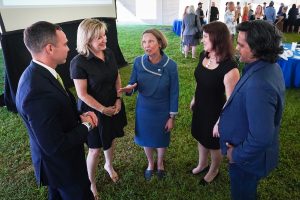
“[The New College Challenge] is an opportunity for knowledge exchange,” Sabia said, to which Hanson added, “New College has the opportunity to be the academic and intellectual epicenter of our community.”
Special guest William Dudley, a New College alumnus and the former president/CEO of the Federal Reserve Bank of New York, also discussed the topic of “resilience” from an economic/financial perspective.
“My vision for the future of New College is one that continues our story of transformation,” Okker said, “to create the best environment for our students who have big, bold ideas, and who stand out to employers as the resilient problem solvers of tomorrow.”
And, as Dudley put it: “Let’s do the work and we’ll have a great future together.”
For more information on The New College Challenge and photos from this event, visit ncf.edu/challenge.
Watch The New College Challenge Tuesday event here: youtu.be/DwP_zR2KJtQ.
More free events will follow this week (RSVP here):
New Topics Lecture

Featured Speaker: Chris Reed, professor, Harvard University, founding director of STOSS Landscape Urbanism
A leading national voice in transforming landscapes and cities, Reed will share his ambitious vision to be climate-ready in order to protect our coastlines. Topic: “Climate Crisis Now! Learning and Landscapes in a Changing Environment.”
Designing for Resilience Symposium
Friday, Oct. 28, 8:30 a.m. to 4:30 p.m.:
A one-day symposium on coastal resilience and adaptive strategies. How can we design more resilient communities in the face of coastal threats like storm surge? Engage with national experts as they present case studies and research relevant to the Gulf Coast. Your questions and input will offer direction for their ongoing work in our community during the months to come.
Location: Tent on the bayfront
RSVP here
Livestream: youtube.com/watch?v=fST9KVqrN6c
President Okker’s October 25 Speech at The New College Challenge Kickoff:
I’m Pat Okker, president of New College of Florida. Welcome to our campus. I’m excited that you’ve joined us at this important moment for our college and our community as we begin a unifying year-long initiative to dream big and innovatively, and as we kick off The New College Challenge.
We are a community ready to take on the challenges of the future. Today, I want to share a story about transformation. It started in 1960 when New College began.
New College. Our purpose is built into our very name. As our founders put it, “New College was named for a purpose. It is not, and never will be, another college. It is, and will always remain the new college, seeking new solutions to new educational needs.”
If ever there was a time to embrace new solutions, it is now. Whether through the unprecedented disruptions in the world of work, pressures on higher education, or the urgency of coastal resilience, this is no time for the status quo. Our launch of The New College Challenge today is, at its heart, a commitment to resilience of all kinds and to the transformations necessary to achieve that resilience.
Our founders had a clear vision for their “New” college. They understood that academic excellence was their absolute foundation. But they also knew that attracting the best and the brightest minds was not enough. They wanted to nurture individuals who made a difference in the world, and so they designed a curriculum to achieve that.
I’ve been at New College just over a year and have talked with many people about what makes a New College graduate different. My favorite stories come from people who have hired New College graduates. One is from an employer who had been struggling with a complex issue in his organization. Frustrated, he gave the problem to a recent hire, a New College graduate, who, as he told me, “disappeared for a few days” (and then came back with a concise description of what the underlying issue was, research on how other organizations had solved similar problems, and a recommendation of the best course of action). He told me that this hire was still, years later, his best hire ever.
New College is and has always been a college committed to nurturing these transformational problem solvers who find solutions when others cannot. This is why we exist. And it’s why we do things differently here. It’s why we don’t assign grades and why we do encourage intellectual risk taking. It’s why our curriculum is challenging and why we require students to complete independent projects all four years. Our curriculum isn’t designed to sort students into arbitrary buckets but rather to give them the skills and confidence they need to tackle complex problems (even hard ones like coastal resilience).
And the proof is both right here under this tent and in our alumni throughout Florida and the nation. New College alumni are more often than not innovators who find opportunities where others see only challenges: scientists who have opened up new areas of research, artists and organizers who have led community development projects, government leaders who make a real difference in the communities they serve, entrepreneurs whose businesses have spawned entire new industries.
I’m incredibly honored to have with us today all five members of the President’s Advisory Council, who are serving as strategic advisers to The New College Challenge. Their backgrounds are varied, but each of them has led through transformations in finance, nonprofit, energy and pharmaceutical industries. They understand—and I dare say, cherish—the critical thinking that they developed in the liberal arts. And they see enormous opportunities for New College.
The reason for their optimism—and mine—is that the world needs problem solvers more than ever. Industries and communities throughout Florida and the nation are experiencing unprecedented disruptions. As an honors college, we will never provide huge numbers of graduates. But we can, and must, focus on preparing the kinds of transformational problem solvers and leaders required for our region and state to thrive.
New College is proud to be recognized as a top five public liberal arts college in the U.S. But, if we take seriously the kinds of transformations we are considering, New College can be recognized as one of the best national colleges of liberal arts and sciences overall (public or private). To realize that potential, however, we cannot simply follow the path our founders set before us. We have to have the courage and discipline to do things differently.
These transformations have already started here at New College. New College students are paired with professional career coaches even before they arrive on campus, our faculty integrate career outcomes into the curriculum, and we have a goal to provide an internship for every student at New College. This approach to career education and work-based learning has garnered national recognition and is resonating with prospective students and their families. It’s one of many reasons that our class of new students is up more than 30 percent over last year, at a time when enrollment across higher education is declining.
But we need to do more to ensure that this generation of New College students can become the transformational problem solvers of tomorrow. We need new partnerships with employers, our community and other academic institutions.
Becoming a top college of liberal arts and sciences in the nation is not just a story about New College. It is a story about transformation in higher education. The model of liberal arts colleges, dominated by private schools in the Northeast, is unsustainable and disconnected to the economic and demographic shifts taking place in our nation.
Florida is poised to become the tenth largest economy in the world by 2030. To achieve that, we need—and deserve—a top college of arts and sciences right here in Florida that nurtures resilient, transformational leaders. Right now, Florida students who want to attend a top-ranked college of arts and sciences are forced to go out of state for their education. New College can play a key role in retaining this top talent for our state.
The New College Challenge is our vehicle to get us there. The design teams we’ve invited will help us find new and fresh ways to improve our infrastructure, to ensure that our campus supports our students. The relationships with employers, community members and other academic institutions we are developing through The Challenge will ensure the very resilience of New College.
Hurricane Ian was a powerful reminder of the urgency of the transformations that must take place. The destruction has been devastating. But the signs of resilience are everywhere. The Sanibel Causeway is a prime example—cut in pieces by Hurricane Ian, it has already reopened.
The New College Challenge is our own path to resilience. Starting today with all of you over brunch, we’ll begin many community conversations so that our academic experts have meaningful input (your input). So, when they form interdisciplinary student teams for their Spring classes, they can focus on bold, viable concepts for New College.
Together, we will find solutions we can realize. My vision for the future of New College is one that continues our story of transformation, to create the best environment for our students who have big, bold ideas, and who stand out to employers as the resilient problem solvers of tomorrow.
Founded in 2009, the SMI has provided opportunities in and beyond Sarasota County to learn and practice mindfulness meditation. The organization’s mission has been to educate the public through classes and retreats in mindfulness meditation, and to provide a supportive space for building community and practicing mindfulness. New College has been working with the SMI since 2016, when the College started developing classes and Independent Study Projects (ISPs) on mindfulness.
“The pandemic really affected the SMI, since it became very difficult to have people come together to practice mindfulness,” said New College Assistant Professor of Religion Manuel Lopez, Ph.D. “After some months of pondering the future of the SMI, they decided that it was better to close the organization and donate the money to local institutions and organizations that could continue the mission of the SMI. I think it is a sign that the SMI believes in what we do at the College.”
Kurt Maurer, Ph.D.—the chair of the board of directors at the SMI—said Lynne Lockie’s class at the SMI has been very popular with New College students and faculty.
“In the past year, we have been searching for ways to further our mission and Dr. Lopez’s plan for the use of the SMI’s funds,” Maurer said. “New College was the perfect place for the SMI’s donation.”
The College plans to use the funds to promote the practice of mindfulness within New College and the Sarasota-Manatee community at large. Plans include developing a series of lectures with prominent speakers, classes, and workshops over the next three years that will focus on the benefits of mindfulness. The workshops will involve partnerships with three to five local organizations that could benefit from mindfulness training to further their missions and goals.
“While mindfulness is not a solution to all problems or is even recommended to deal with some mental health issues, we strongly believe that mindfulness can be an extremely useful tool to deal with a wide variety of issues, such as anxiety, depression, etc.,” Lopez said. “This does not replace the work that should be done with mental health professionals, but it can add an invaluable tool to deal with and manage some of those problems.”
Dr. Maurer added, “We wish to thank Dr. Lopez and New College for their interest and dedication to empowering people to live happier, healthier, less stressful lives, and to cultivate a more peaceful, tolerant world.”
For more information about this gift or the New College Foundation, visit ncf.edu/foundation or call 941-487-4800.
While the country was steeped in the controversies of the ’60s, New College was creating a program that reflected the ideals of an individualized academic program that focused on mastery rather than competition.
That spirit of trailblazing continues at New College, taking the form of a new grand experiment that is being launched this fall.
Called The New College Challenge, this first-of-its kind yearlong initiative will transform the campus into a community incubator for exploring the future of higher education, as well as social and coastal resilience.
“From its beginnings, New College has been an innovator. The Challenge takes that further,” said New College of Florida President Patricia Okker, Ph.D. “Now we’re working with higher education, business and community partners to reinvigorate our campus. This is a way to help us jump headfirst into a more resilient, sustainable and eco-friendly future.”
And New College is the ideal setting for this collaborative undertaking. Students at New College embody the values of creativity, curiosity and individual thinking above convention and conformity. The College is also a launching pad for entrepreneurs who go on to solve the world’s biggest problems and positively impact the global landscape.
Modeled after two endeavors in the Northeast (“Envision Resilience: Nantucket Challenge” and “Envision Resilience: Narragansett Bay”), The New College Challenge will build partnerships with students, leaders from major statewide and national universities, and experts across key industries. These visionaries will address the social, economic and environmental challenges that face the region and the world today.
New College has the potential to serve as a sustainable model for a new era in higher education—one that will have the socioeconomic fortitude to nurture the leaders of tomorrow.
“The New College Challenge is designed to ensure that our institution is recognized for its tremendous value, is relevant to future generations, and is resilient to the pressures from our ever-changing world,” Okker said. “We know we can become the model for an honors liberal arts education in the 21st century.”
Challenge Launch Week Events
Tues. 10/25 10 a.m. to 12 p.m. Kickoff Brunch
Join us as we launch the New College Challenge. Brunch includes regional leaders, design experts and special guest speaker William C. Dudley ’71, former President & CEO of the Federal Reserve Bank of New York, who helped to successfully navigate the 2008 financial crisis.
Event on the New College bayfront.
Wed. 10/26 5:30 – 6:30 p.m. New Topics Public Lecture, Chris Reed, Harvard University
A leading national voice in transforming landscapes and cities, Reed will share his ambitious vision to be climate ready in order to protect our coastlines. Topic: “Climate Crisis Now! Learning and Landscapes in a Changing Environment.”
Event in the Sainer Auditorium.
Fr. 10/28 8:30 a.m. – 4:30 p.m. “Designing for Resilience”
A one-day symposium on coastal resilience and adaptive strategies. How can we design more resilient communities in the face of coastal threats like storm surge? Engage with national experts as they present case studies and research relevant to the Gulf Coast.
Event on the New College bayfront.
RSVP HERE for any or all of the FREE events.
For more information, contact [email protected] and visit ncf.edu/challenge.
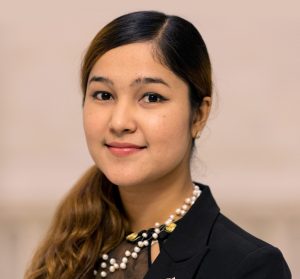
October 26, 2022
“Climate Crisis Now! Learning and Landscape in a Changing Environment”
Chris Reed, a Harvard Professor of Architecture and a leading voice in the transformation of landscapes and cities, will discuss his award-winning strategies related to coastal resilience. With an eye toward the local context of the New College campus and its place on the Gulf Coast, Reed will explore reimagining the role of higher education in community resilience.
January 25, 2023
“Fleeing Atrocities: Witness Perspectives” (a partnership with the United States Holocaust Memorial Museum and the Dr. Helen N. Fagin Holocaust, Genocide and Human Rights Collection)
Join us for a powerful conversation with two witnesses of mass atrocities nearly 80 years apart: Holocaust survivor Louise Lawrence-Israëls and Rohnigya witness and survivor Wai Wai Nu. This discussion will be moderated by Naomi Kikoler, director of the United States Holocaust Memorial Museum’s Simon-Skjodt Center for the Prevention of Genocide. This conversation will shine a light on the ongoing persecution of the Rohingya in Burma and the unique perspective that Holocaust survivors bring to contemporary issues. In March, Secretary of State Anthony Blinken chose the Museum as the location for announcing the U.S. government’s determination of genocide in Burma. It was there that Lawrence-Israëls and Nu first met.
February 16, 2023
“The Bigger Picture: Entertainment Marketing in a Changing World”
Join Smitty Smith ’70 and Jackson George ’95 as they discuss Hollywood and the evolution of entertainment marketing. Smith is a movie industry veteran and the CEO of the creative agency, InSync Plus. George is a creative advertising executive with Disney. The two will discuss how Hollywood develops movies and markets products to consumers. With witty stories and insights, Smith and George will explore how Hollywood is changing, and how rapidly advancing technologies influence the marketing and distribution of movies.
March 21, 2023
“The Sound of the Sea: Seashells and the Fate of the Oceans” with Cynthia Barnett
Award-winning environmental author Cynthia Barnett explores the long, rich and surprisingly profound relationship between humans and seashells. Traveling from Florida to the Bahamas to the Maldives, West Africa and beyond, Barnett uncovers the ancient history of shells as global currency (including their use as religious and luxury objects, and the rarely appreciated but remarkable creatures that make them). While shells reveal how humans have altered the climate and the sea—down to its very chemistry—they are also sentinels of hope for coastal adaptation for climate change, alternative energy and other solutions that lie beneath the waves.
All “New Topics” events will be held in Sainer Pavilion on the New College campus at 5:30 p.m. Tickets are $10 with some exceptions. To register, visit ncf.edu/new-topics. For questions, contact the New College Foundation at 941-487-4800 or [email protected].
